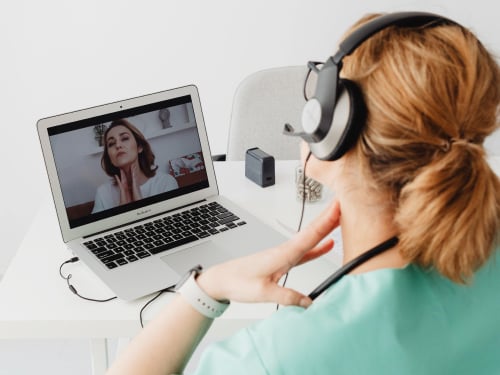In an age where digitalization is reshaping nearly every aspect of our lives, the adoption of digital health solutions is increasingly vital. Telehealth has gained significant momentum, due in no small part to Covid-19. During the pandemic, many patients experienced virtual consultations and remote monitoring for the first time.
Virtual healthcare – come to stay
The primary driver of telehealth adoption during the pandemic was the need to minimize the transmission of the virus within healthcare facilities. To protect both patients and healthcare professionals, in-person consultations were replaced with virtual doctor appointments wherever possible. However, ‘televisits’ have since proven themselves to be beneficial in more ways than one, leading to more patient-centric care as well as expanded access to care for those in remote and underserved areas.
“Virtual doctor-patient appointments provide many advantages. One of them is saving time. The last time we went to the hospital to talk about the results of some exams, it took us more than one hour to get there, another hour of waiting, and then a consultation with that lasted less than 10 minutes. There are a lot of situations, when a virtual consultation makes more sense, for example, a discussion with a doctor or to receive results. By meeting digitally, patients can save time and travel costs, while still getting clear advice from their doctor,” explains Roel Hoorenman, Healthcare expert at QConferencing, provider of the Dutch telehealth solution FaceTalk.
FaceTalk is an online consultation platform that enables doctors make safe video calls with patients and other healthcare professionals.
“When we brought FaceTalk to the Dutch market, we wanted to provide a solution that is safe and easy to use for both healthcare professionals and patients,” says Roel. There should not be any limits in technology. Everyone can participate from their own tablet or smartphone from their own consulting room or even living room.
Netherlands experiences growing demand for personalized health services
Like many developed countries, the Netherlands is experiencing an aging population, which has led to increased demand for more efficient and personalized healthcare services – especially services that are easy to use for elderly patients. “With FaceTalk, appointments can be easily scheduled, and there is also the possibility for ad-hoc meetings, where the doctor sends out the meeting link. All video meetings can be accessed in the browser, there is no need to download an app.”
How FaceTalk works to connect patients to their healthcare professionals
In just three simple steps, the patient is connected to the healthcare provider via FaceTalk:
- The doctor or assistant sends an e-mail invitation to the client with details of the appointment.
- At the time of the appointment, the client clicks on the link in the email invitation. FaceTalk opens in the browser and the client automatically enters the ‚digital waiting room‘.
- As soon as the practitioner starts the video call, the client receives a notification. After accepting the notification, the video call will start automatically.
A video consultation is also possible without an appointment. With the 'direct video calling' functionality, it is possible to set up a video consultation within a few seconds. The practitioner generates a unique code within FaceTalk and communicates this by telephone to the patient or colleague, who then can join the meeting via viacode.nl. From an invitation message to the lobby and finally the video meeting – the entire process can be branded in the layout of the hospital.
In addition to making life easier for patients, virtual care solutions can also help streamline administrative tasks, such as appointment scheduling, and expand access to services as well.
Furthermore, hospitals can reduce no-shows or late cancellations, as this happens more often with in-person appointments. Another benefit can be found in multidisciplinary meetings, allowing medical experts from different disciplines and healthcare institutions to join easily to discuss a patient's case. District nurses can, for example, call for the help of a specialist when they are with the client. This way, a specialist can watch and support the district nurses where necessary.
With increasing digitalization across healthcare, providers are increasingly investing in electronic health records and health information systems with the goal of streamlining processes and boosting efficiency. This trend aims to improve interoperability, enable the secure sharing patient data and enhance the care coordination among different providers.
Integrating systems and electronic health records
“Each hospital is already working with a mix of technologies. To be efficient, it is crucial that the various systems are interconnected. With FaceTalk we are flexible. For example, FaceTalk has its own agenda and planning for doctors. At the same time, it can also be integrated into the native calendars for hospitals. Meeting invitations can be sent directly from Outlook, for instance. The scheduling can be integrated on the hospitals website or patient portal. Electronic patient data can be integrated as well. And integration with the CRM system is possible, so that doctors just need to click on a button to access relevant patient information,” explains Roel from QConferencing.
Safe use of client information is of great importance in healthcare. Hospitals and doctors are required to keep records for each patient according to the Dutch Medical Treatment Contracts Act and protect all patient information. And medical records that contain special personal data must be protected according to the rules of the General Data Protection Regulation (GDPR).
FaceTalk, which is based on Pexip technology, is running on its own servers in a secure data center in the Netherlands. All information is strictly encrypted and in compliance with ISO 27001 and NEN7510 standards for information security in healthcare. As video communication happens in real time, additional medical information shared during the online conversation is not automatically saved. In addition, all video consultations take place in unique and one-time online consultation rooms.
“Pexip provides not only the possibility to host video conferencing platform on private servers, but also integrate with other technologies and customize our customers’ workflows and meeting design, while keeping up highest privacy and security standards,” concludes Roel.
Today FaceTalk is used during the diagnosis and treatment of skin cancer and dermatology, during the treatment of cardiovascular diseases, for emergency care, the guidance and monitoring of MS patients and for distance education. Renowned healthcare organizations throughout the Netherlands and Belgium, including UMC Maastricht, Albert Schweitzer Ziekenhuis or Treant are currently relying on FaceTalk for video consultations.
Users vs technology
Of course, the FaceTalk relies on technology. But in a healthcare environment, users (patients) may not be very technical, which can make them nervous for a video call with their provider. That’s why FaceTalk goes to great lengths when it comes to branding and out-of-the-box customizations for the user experience – making sure that even non-tech savvy users have a great experience. FaceTalk ensures that users quickly and easily recognize the healthcare organization and the doctors, all while remaining at ease throughout video consult.
At the same time, FaceTalk is backed by a wide range of encryption and security measures to ensure a safe and private consult.
When you combine these FaceTalk benefits with our extensive integration options that streamline the appointment handling, the result is a full-scale, real-life video solution that focuses on the needs of actual patients.
Read more about Facetalk's solutions here
- Healthcare
- Personalize customer engagement
- Video Platform



.png?width=500&name=Copy%20of%20Blog%20header%20(2).png)

